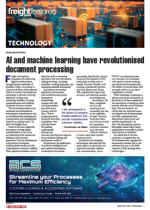Technology-driven solutions like Warehouse Management Systems (WMS) and Internet of Things (IoT) devices are increasingly being deployed in the logistics sector, offering enhanced efficiency, accuracy and visibility throughout the supply chain. According to Anthea van Breemen of Forte Supply Chain Solutions, these solutions are optimising operations, particularly in inventory management and order fulfilment.“WMS software enables real-time tracking of stock levels, streamlining inventory processes while improving overall order accuracy,” she said. “With enhanced visibility across the supply chain, businesses can respond faster to f luctuations in demand, minimising delays and reducing costs. Incorporating data aggregation tools like FLOW further enhances the system by capturing and analysing vast amounts of WMS information over time. This data-driven approach allows for more informed decision-making, with predictive insights improving operational performance. The use of Artificial Intelligence (AI) in the analysis and reporting process is becoming more prevalent, offering businesses real-time insights, anomaly detection, and automated recommendations.”Additionally, warehouses are evolving to accommodate a wide range of products, including perishable goods, by integrating multi-temperature zones to maintain optimal storage conditions. This ensures that goods are stored at the correct temperatures, minimising spoilage and maintaining product quality.Compliance reporting applications are also being adopted for faster, more accurate and easily accessible data. These applications streamline regulatory reporting processes, ensuring businesses meet legal requirements without delay, while also providing transparency and traceability throughout the supply chain.According to Van Breemen, the cost of implementing new technologies can be prohibitive, leading many companies to delay adoption. "This results in significant future costs and even loss of revenue," she told Freight News. “There is also ongoing resistance to change from employees, and retaining skilled, trained workers in an increasingly tech-driven environment can be challenging." One of the biggest obstacles, she noted, was the complexity of integrating different systems. "If not done properly, the entire system can collapse. The importance of integration cannot be overstated – many companies still have data sitting in silos, unable to connect with other systems. This creates significant inefficiencies." Van Breemen emphasised the critical role of data integrity: "Base data accuracy is essential for integrated systems to function optimally. If the input data is f lawed, the reports and decisions derived from it will be equally faulty."Looking ahead, Van Breemen said hyper-automation was expanding across the supply chain, allowing businesses to automate even more processes, increasing efficiency and reducing manual errors. “This trend is transforming how logistics operations function by streamlining workf lows, reducing costs and boosting overall productivity. The advent of 5G connectivity is also expected to play a key role, enabling faster data transfer and supporting real-time applications like IoT-enabled devices." LV

